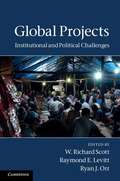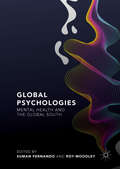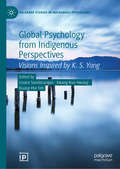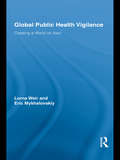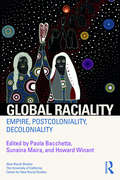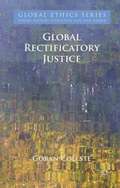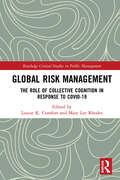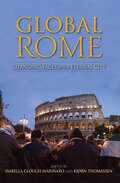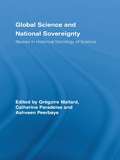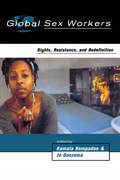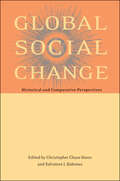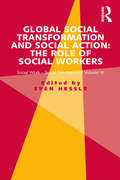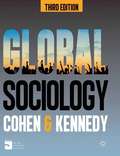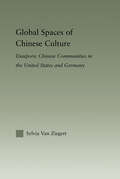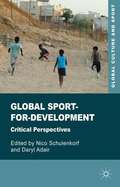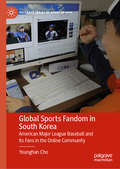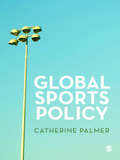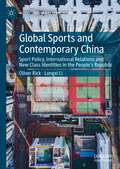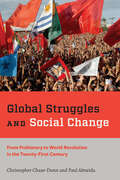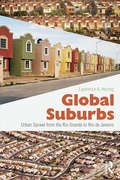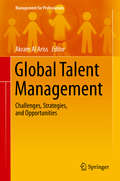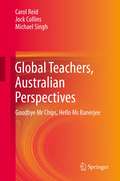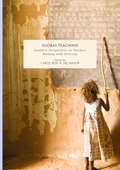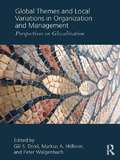- Table View
- List View
Global Projects
by W. Richard Scott Raymond E. Levitt Ryan J. OrrAn analysis of the institutional and social movement processes that surround global infrastructure projects.
Global Psychologies: Mental Health and the Global South
by Roy Moodley Suman FernandoThis book critiques our reliance on Eurocentric knowledge in the education and training of psychology and psychiatry. Chapters explore the diversity of ‘constructions of the self’ in non-Western cultures, examining traditional psychologies from Africa, Asia, Australasia, and Pre-Columbian America. The authors discuss liberation psychologies and contemporary movements in healing and psychological therapy that draw on both Western and non-Western sources of knowledge. A central theme confronted is the importance, in a rapidly shrinking world, for knowledge systems derived from diverse cultures to be explored and disseminated equally. The authors contend that for this to happen, academia as a whole must lead in promoting cross-national and cross-cultural understanding that is free of colonial misconceptions and prejudices. This unique collection will be of value to all levels of study and practice across psychology and psychiatry and to anyone interested in looking beyond Western definitions and understandings.
Global Psychology from Indigenous Perspectives: Visions Inspired by K. S. Yang (Palgrave Studies in Indigenous Psychology)
by Kwang-Kuo Hwang Louise Sundararajan Kuang-Hui YehThis volume celebrates the visions of a more equitable global psychology as inspired by the late Professor K. S. Yang, one of the founders of the indigenous psychology movement. This unprecedented international debate among leaders in the field is essential for anyone who wishes to understand the movement from within—the thinking and the vision of those who are the driving forces behind the movement. This book should appeal to scholars and students of psychology, sociology, anthropology, ethnology, philosophy of science, and postcolonial studies.
Global Public Health Vigilance: Creating a World on Alert (Routledge Studies in Science, Technology and Society)
by Lorna Weir Eric MykhalovskiyGlobal Public Health Vigilance is the first sociological book to investigate recent changes in how global public health authorities imagine and respond to international threats to human health. This book explores a remarkable period of conceptual innovation during which infectious disease, historically the focus of international disease control, was displaced by "international public health emergencies," a concept that brought new responsibilities to public health authorities, helping to shape a new project of global public health security. Drawing on research conducted at the World Health Organization, this book analyzes the formation of a new social apparatus, global public health vigilance, for detecting, responding to and containing international public health emergencies. Between 1995 and 2005 a new form of global health surveillance was invented, international communicable disease control was securitized, and international health law was fundamentally revised. This timely volume raises critical questions about the institutional effects of the concept of emerging infectious diseases, the role of the news media in global health surveillance, the impact of changes in international health law on public health reasoning and practice, and the reconstitution of the World Health Organization as a power beyond national sovereignty and global governance. It initiates a new research agenda for social science research on public health.
Global Raciality: Empire, PostColoniality, DeColoniality (New Racial Studies)
by Sunaina Maira Howard Winant Paola BacchettaGlobal Raciality expands our understanding of race, space, and place by exploring forms of racism and anti-racist resistance worldwide. Contributors address neoliberalism; settler colonialism; race, class, and gender intersectionality; immigrant rights; Islamophobia; and homonationalism; and investigate the dynamic forces propelling anti-racist solidarity and resistance cultures. Midway through the Trump years and with a rise in nativism fervor across the globe, this expanded approach captures the creativity and variety found in the fight against racism we see the world over. Chapters focus on both the immersive global trajectories of race and racism, and the international variation in contemporary configurations of racialized experience. Race, class, and gender identities may not only be distinctive, they can extend across borders, continents, and oceans with remarkable demonstrations of solidarity happening all over the world. Palestinians, Black Panthers, Dalit, Native Americans, and Indian feminists among others meet and interact in this context. Intersections between race and such forms of power as colonialism and empire, capitalism, gender, sexuality, religion, and class are examined and compared across different national and global contexts. It is in this robust and comparative analytical approach that Global Raciality reframes conventional studies on postcolonial regimes and racial identities and expression.
Global Rectificatory Justice (Global Ethics Series )
by Göran CollsteWhat are the implications of colonialism for a theory of global justice today? What does rectificatory justice mean in the light of colonialism? What does global rectificatory justice require in practice? The author seeks to answer these questions covering a significant gap in the literature on global justice.
Global Risk Management: The Role of Collective Cognition in Response to COVID-19 (ISSN)
by Louise K. Comfort Mary Lee RhodesThe rise and spread of Covid-19 in the beginning of 2020 presents a once-in-a-century challenge and opportunity for decision makers, managers, scholars, and citizens to understand the risks, mitigate its impact and prepare for future crises. Drawing on a global network of scholars, this book presents a comparative analysis of ten nations’ response to a global pandemic, while operating nominally under the framework of the World Health Organization. The book introduces the concept of ‘collective cognition’ as an analytic lens for examining the nations’ response to Covid-19 during the first six months of the emerging pandemic (January – June 2020) and draws out insights for improving systems of global risk management. This book addresses four primary audiences: policy-makers and leaders in nations struggling to contain viruses while guiding their societies under threat; academic researchers, students, and educators engaged in preparing the next generation of professionals committed to investigating emerging risk: managers of non-profit and private organizations that operate and maintain the networks of social, technical, and economic services that are essential to functioning communities; and the informed general public interested in understanding this extraordinary sequence of events and in managing the novel risk of COVID-19 in a more informed, responsible way.
Global Risk Management: The Role of Collective Cognition in Response to COVID-19 (Routledge Critical Studies in Public Management)
by Louise K. Comfort Mary Lee RhodesThe rise and spread of Covid-19 in the beginning of 2020 presents a once-in-a-century challenge and opportunity for decision makers, managers, scholars, and citizens to understand the risks, mitigate its impact and prepare for future crises. Drawing on a global network of scholars, this book presents a comparative analysis of ten nations’ response to a global pandemic, while operating nominally under the framework of the World Health Organization. The book introduces the concept of ‘collective cognition’ as an analytic lens for examining the nations’ response to Covid-19 during the first six months of the emerging pandemic (January – June 2020) and draws out insights for improving systems of global risk management. This book addresses four primary audiences: policy-makers and leaders in nations struggling to contain viruses while guiding their societies under threat; academic researchers, students, and educators engaged in preparing the next generation of professionals committed to investigating emerging risk: managers of non-profit and private organizations that operate and maintain the networks of social, technical, and economic services that are essential to functioning communities; and the informed general public interested in understanding this extraordinary sequence of events and in managing the novel risk of COVID-19 in a more informed, responsible way.
Global Rome: Changing Faces Of The Eternal City (New Anthropologies of Europe)
by Bjørn Thomassen Isabella Clough MarinaroIs 21st-century Rome a global city? Is it part of Europe's core or periphery? This volume examines the "real city" beyond Rome's historical center, exploring the diversity and challenges of life in neighborhoods affected by immigration, neoliberalism, formal urban planning, and grassroots social movements. The contributors engage with themes of contemporary urban studies-the global city, the self-made city, alternative modernities, capital cities and nations, urban change from below, and sustainability. Global Rome serves as a provocative introduction to the Eternal City and makes an original contribution to interdisciplinary scholarship.
Global Science and National Sovereignty (Routledge Studies in the History of Science, Technology and Medicine)
by Grégoire Mallard Catherine Paradeise Ashveen PeerbayeGlobal Science and National Sovereignty: Studies in Historical Sociology of Science provides detailed case studies on how sovereignty has been constructed, reaffirmed, and transformed in the twentieth century by the construction of scientific disciplines, knowledge practices, and research objects. Interrogating the relationship of the sovereign power of the nation state to the scientist's expert knowledge as a legitimating – and sometimes challenging – force in contemporary society, this book provides a staggering range of case studies in its exploration of how different types of science have transformed our understanding of national sovereignty in the last century. From biochemical sciences in Russia, to nuclear science in the US and Europe, from economics in South Asia, to climatology in South America, each chapter demonstrates the role that scientists play in the creation of nation-states and international organizations. With an array of experts and scholars, the essays in Global Science and National Sovereignty: Studies in Historical Sociology of Science offer a complete redefinition of the modern concept of sovereignty and an illuminating reassessment of the role of science in political life.
Global Sex Workers: Rights, Resistance, and Redefinition
by Kamala Kempadoo Jo DoezemaGlobal Sex Workers presents the personal experiences of sex workers around the world. Drawing on their individual narratives, it explores international struggles to uphold the rights of this often marginalized group.
Global Social Change: Historical and Comparative Perspectives
by Christopher Chase-Dunn and Salvatore J. BabonesThis informative and exciting volume brings together accomplished sociologists and scholars to offer an introduction to ways of studying and understanding global social change.The essays in Global Social Change explore globalization from a world-systems perspective, untangling its many contested meanings. This perspective offers insights into globalization's gradual and uneven growth throughout the course of human social evolution. In this informative and exciting volume, Christopher Chase-Dunn and Salvatore J. Babones bring together accomplished senior sociologists and outstanding younger scholars with a mix of interests, expertise, and methodologies to offer an introduction to ways of studying and understanding global social change.In both newly written essays and previously published articles from the Journal of World Systems Research, the contributors employ historical and comparative social science to examine the development of institutions of global governance, the rise and fall of hegemonic core states, transnational social movements, and global environmental challenges. They compare post–World War II globalization with the great wave of economic integration that occurred in the late nineteenth century, analyze the rise of the political ideology of the "globalization project"—Reaganism-Thatcherism—and discuss issues of gender and global inequalities.
Global Social Transformation and Social Action: Social Work-Social Development Volume III
by Sven HessleGlobal social transformation calls for global social action. 2010 saw the launch of The Global Agenda for Social Work and Social Development, which detailed how social workers can strive to bring about increased social justice. The time is right to start to address and demonstrate the actions that might be required to develop and accomplish the Agenda - with regard to methods in practice and research, in social policy and social work education, and in a broader discourse of global commitment and cooperation. This informative and incisively written edited collection brings together experts from around the world to discuss issues which the social work and social welfare sectors face every day and to ensure a closer link between evidence-based practice, policy objectives and social development goals. Furthermore, this book reveals how these may affect the conditions of people and demonstrate how the social work and social development community can contribute to sustainable development.
Global Sociology
by Paul Kennedy Robin CohenGlobal Sociology is the authority on global issues in contemporary society, introducing key sociological topics, themes and debates from a consistently global point of view. Deep connections are made between the "everyday" and globalization processes, with focus on how individuals perceive, react to or cope with incoming global forces and incorporate them into their private worlds. Global Sociology: offers strong coverage of contemporary topics, such as intimacy, financial sociology and the environment takes an unbiased approach which encourages critical thinking, optimism, and social consciousness provides an explicitly sociological focus alongside political, cultural, economic and anthropological perspectives, highlighting how concepts from these disciplines interact. The new edition has been thoroughly updated to include: discussions of recent topics and events such as the recession, new uses of social media, the Arab Spring and the Occupy movement new sections on finance and economic sociology, family, technology, and the environment more in-depth debate on sociological theory and discussion of key sociological terms a new "A pause to reflect" feature which encourages students to engage critically with chapter content. Global Sociology has been streamlined and restructured to better suit teaching needs and to strengthen linkages between similar themes throughout.
Global Spaces of Chinese Culture: Diasporic Chinese Communities in the United States and Germany (Studies in Asian Americans)
by Sylvia Van ZiegertThis book is an exploration of how Chinese communites in the United States and Germany create and disseminate a sense of diasporic Chinese identity. It not only compares the local conditions of the Chinese communities in the two locations, but also moves to a global dimension to track the Chinese transnational imaginary. Van Ziegert analyzes three strategies that overseas Chinese use to articulate their identities as diasporic subjects: being more American/German being more Chinese hybridizing and commodifying Chinese culture through trans-cultural performances. These three strategies are not mutually exclusive and they often intersect and supplement each other in unexpected ways. The author also analyzes how the everyday lives of overseas Chinese connect with global and local factors, and how these experiences contribute to the formation of a global Chinese identity.
Global Sport-for-Development
by Nico SchulenkorfThis book provides a critical approach to sport-for-development, acknowledging the potential of this growing field but emphasising challenges, problems and limitations - particularly if programs are not adequately planned, delivered or monitored.
Global Sports Fandom in South Korea: American Major League Baseball and Its Fans in the Online Community (Palgrave Series of Sport in Asia)
by Younghan ChoThis book explores the transformation of cultural and national identity of global sports fans in South Korea, which has undergone extensive cultural and economic globalization since the 1990s. Through ethnographic research of Korean Major League Baseball fans and their online community, this book demonstrates how a postcolonial nation and its people are developing long-distance affiliation with American sports accompanied by nationalist sentiments and regional rivalry. Becoming an MLB fan in South Korea does not simply lead one to nurturing a cosmopolitan identity, but to reconstituting one’s national imaginations. Younghan Cho suggests individuated nationalism as the changing nature of the national among the Korean MLB fandom in which the national is articulated by personal choices, consumer rights and free market principles. The analysis of the Korean MLB fandom illuminates the complicated and even contradictory procedures of decentering and fragmenting nationalism in South Korea, which have been balanced by recalling nationalism in combination with neoliberal governmentality.
Global Sports Policy
by Catherine Palmer"Lifts the analysis out of the nuts and bolts of sports policy and into some really thought-provoking areas which will equip the policy maker for the challenges of the 21st century" - Dominic Malcolm, Loughborough University "This is an excellent analysis of the significance of globalisation for national sport policy and especially of the impact of global processes at the local socio-cultural level" - Barrie Houlihan, Loughborough University Drawing upon a range of empirical case studies, Catherine Palmer situates sports policy within a broader consideration of global processes, practices and consequences, exploring the relationship between: the local and the global globalization and governance new technologies human rights the environment corporate responsibility. In doing so she sets out the ground for an understanding of policy making in sport and how this affects society. Covering both theory and practice, it is a detailed and thought provoking resource for students of sports policy, sports development, sports management and sports studies.
Global Sports and Contemporary China: Sport Policy, International Relations and New Class Identities in the People’s Republic (Global Culture and Sport Series)
by Oliver Rick Longxi LiThis book examines the formation of a globally oriented sports system in China, from the beginning of the reform process in 1978 to the present, focusing on the period after the Beijing 2008 Olympic Games. It analyses how this system has shaped domestic social class identities and its role in international Chinese state politics. Despite advances in the marketization of the sports industry through previous eras, the Chinese state expanded investment in a set of global sports following the heavily government-directed drive towards national success at the 2008 Beijing Summer Olympic Games. This would be a time when the government focused on policies set to service a growing domestic middle-class and an increasingly wide-ranging set of international interests, with sporting investments being at the heart of their strategic plan. However, reform has proven difficult. The book presents a well-rounded account of this effort with tennis and soccer providing important case studies of the internal and external dynamics of this time. As such, the book will be of interest to researchers and students of globalization of sport, those studying East Asian sports development, and those who are interested in understanding China more broadly.
Global Struggles and Social Change: From Prehistory to World Revolution in the Twenty-First Century
by Paul Almeida Christopher Chase-DunnDeftly demonstrates how the rise and fall of social movements throughout history is closely linked to economic and political developments.In the early decades of the twenty-first century, an international movement to slow the pace of climate change mushroomed across the globe. The self-proclaimed Climate Justice movement urges immediate action to reduce carbon emissions and calls for the adoption of bold new policies to address global warming before irreversible and catastrophic damage threatens the habitability of the planet. On another front, since the 1980s, multiple waves of resistance have occurred around the world against the uneven transition from state-led development to the neoliberal globalization project. Both Climate Justice and Anti-Austerity movements represent the urgency of understanding how global change affects the ability of citizens around the world to mobilize and protect themselves from planetary warming and the loss of social protections granted in earlier eras.In Global Struggles and Social Change, Christopher Chase-Dunn and Paul Almeida explore how global change stimulates the formation and shape of such movements. Contending that large-scale economic shifts condition the pattern of social movement mobilizations around the world, the authors trace these trends back to premodern societies, revealing how severe disruptions of indigenous communities led to innovative collective actions throughout history. Drawing on historical case studies, world system and protest event analysis, and social networks, they also examine the influence of global change processes on local, national, and transnational social movements and explain how in turn these movements shape institutional shifts. Touching on hot-button topics, including global warming, immigrant rights protests, the rise of right-wing populism, and the 2008 financial crisis, the book also explores a broad range of premodern social movements from indigenous people in the Americas, Mesopotamia, and China. The authors pay special attention to periods of disruption and external threats, as well as the role of elites, emotions, charisma, and religion or spirituality in shaping protest movements. Providing sweeping coverage, Global Struggles and Social Change is perfect for students and anyone interested in globalization, international and comparative politics, political sociology, and communication studies.
Global Suburbs: Urban Sprawl from the Rio Grande to Rio de Janeiro (Cultural Spaces)
by Lawrence HerzogGlobal Suburbs: Urban Sprawl from the Rio Grande to Rio de Janeiro offers a critical new perspective on the emerging phenomenon of the global suburb in the western hemisphere. American suburban sprawl has created a giant human habitat stretching from Las Vegas to San Diego, and from Mexico to Brazil, presented here in a clear and comprehensive style with in depth descriptions and images. Challenging the ecological problems that stem from these flawed suburban developments, Herzog targets an often overlooked and potentially disastrous global shift in urban development. This book will give depth to courses on suburbs, development, urban studies, and the environment.
Global Talent Management
by Akram Al ArissThis book bridges the research and practice of global talent management. It opens important theoretical and practical avenues to understand the concept internationally while focusing on developing and emerging countries. Chapters derive from various geographic regions and embrace cross-national, comparative, and interdisciplinary perspectives. An open and inclusive approach is used in assessing the challenges of global talent management, strategies to overcome these challenges, and in charting opportunities for future talent management. These three dimensions are crucial to academic researchers and business practitioners for envisioning a positive future role of talent management in businesses and societies.
Global Teachers, Australian Perspectives: Goodbye Mr Chips, Hello Ms Banerjee
by Michael Singh Jock Collins Carol ReidThis is the first book on global teachers and the increasingly important phenomenon of 'brain circulation' in the global teaching profession. A teaching qualification is a passport to an international professional career: the global teacher is found in more and more classrooms around the world today. It is a two-way movement. This book looks at the growing importance of immigrant teachers in western countries today and at teachers who exit from western countries (emigrant teachers) seeking teaching experience in other countries. Drawing on the international literature in Europe, North America, Asia and elsewhere supplemented by rich insights derived from recent Australian research, the book outlines the personal, institutional and structural processes nationally and internationally underlying the increasing global circulation of teachers. It identifies the key drivers of global teacher mobility: a range of factors including family, lifestyle, classroom experience, travel, opportunities for advancement, discipline, linguistic skills, taxation rates, cultural factors and institutional frameworks and policy support. The book is the first detailed contemporary account of the experiences of Australian immigrant and emigrant teachers in the schools and communities where they teach and live. It makes an important and original theoretical and empirical contribution to the contemporary fields of sociology of education and immigration studies.
Global Teaching: Southern Perspectives on Teachers Working with Diversity (Education Dialogues with/in the Global South)
by Carol Reid and Jae MajorAt a time when social, cultural and linguistic diversity has become a characteristic of education systems around the world, this timely text considers how teacher education is responding to these developments in the context of increased mobilities within and across national boundaries. This collection draws together the work of scholars, from a range of urban, rural and national contexts from the Global South and North, who engage in dialogue about diversity and knowledge exchange. It includes perspectives from multiple contexts using a range of frameworks that cohere around attention to issues of equity and social justice, and focuses on the macro level dynamics (policy, theory, global governance) as well as meso (institutional practices) and micro dimensions (professional identities, cultural, and identity transformation). The authors explore these dynamics and dimensions through mobilities of teachers and students, cosmopolitan theory, indigenous epistemologies, language ecology, professional standards policy discourses, and critical analyses of frameworks including postcolonialism, multiculturalism and culturally responsive and relevant pedagogical approaches.
Global Themes and Local Variations in Organization and Management: Perspectives on Glocalization
by Gili S. Drori Markus A. Höllerer Peter WalgenbachGlobal Themes and Local Variations in Organization and Management: Perspectives on Glocalization offers a broad exposition of the relations between the global and the local with regard to organizational and managerial ideas, practices, and forms. This edited volume forges ahead to capture the complexity of modern management and organization that results from the processes of glocalization. Universality is among the core underlying principles of the management of organizations, as well as of organization and management science itself. Yet, reality reveals enormous variation across social and cultural contexts. For instance, multinational corporations must adjust their management practices to adhere to national regulation and local standards; manufacturers and service providers routinely tailor their products to suit the local preferences of consumers; and non-profit organizations amend their advocacy agenda to appeal to local sentiments. The work assembled here goes beyond merely describing such patterns of variation and adaptation in organization and management; research and commentary engage directly with the tensions between homogeneity and heterogeneity, convergence and divergence, global and local. With contributions from leading scholars in the field of comparative organization studies, this collection offers a substantive contribution to the investigation of organization and management, as well as providing a valuable resource for students of organization studies, international business, and sociology.
